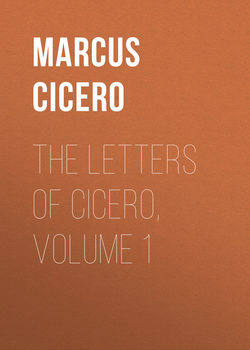Читать книгу The Letters of Cicero, Volume 1 - Марк Туллий Цицерон, Marcus Cicero - Страница 15
CICERO'S LETTERS
XIII (f v, i)
ОглавлениеQ. METELLUS CELER TO CICERO
Cisalpine Gaul
Q. Metellus Celer, son of Quintus, proconsul, greets M. Tullius Cicero. 58
b.c. 62. æt. 44
If you are well I am glad. I had thought, considering our mutual regard and the reconciliation effected between us, that I was not likely to be held up to ridicule in my absence, nor my brother attacked by you in his civil existence and property for the sake of a mere word. If his own high character was not a sufficient protection to him, yet either the position of our family, or my own loyal conduct to you and the Republic, ought to have been sufficient to support him. As it is, I see that he has been ruined and I abandoned by the last people in the world who ought to have done so. I am accordingly in sorrow and wearing mourning dress, while actually in command of a province and army and conducting a war. And seeing that your conduct in this affair has neither been reasonable nor in accordance with the milder methods of old times, you must not be surprised if you live to repent it. I did not expect to find you so fickle towards me and mine. For myself, meanwhile, neither family sorrow nor ill-treatment by any individual shall withdraw me from the service of the state.
58
Q. Metellus Celer had been prætor in b.c. 63 and was now (b.c. 62), as proconsul in Gallia Cisalpina, engaged against the remains of the Catilinarian conspiracy. Meanwhile his brother (or cousin) Q. Cæcilius Metellus Nepos, a tribune, after trying in vain to bring Cicero to trial for the execution of the conspirators, at last proposed to summon Pompey to Rome to prevent danger to the lives of citizens. This attempt led to riots and contests with Cato, and Nepos finally fled from Rome to Pompey. By leaving Rome he broke the law as to the tribunes, and the senate declared his office vacant, and this letter would even seem to shew that the senate declared him a public enemy. This letter of remonstrance is peremptory, if not insolent, in tone, and the reader will observe that the formal sentences, dropped in more familiar letters, are carefully used.
